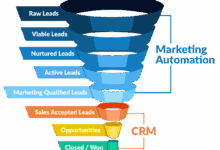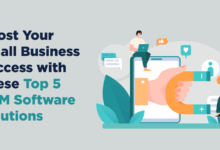AI-Powered CRM Software: A Comprehensive Guide
AI-Powered CRM Software is revolutionizing how businesses manage customer relationships. This technology leverages artificial intelligence to automate tasks, analyze data, and provide insights that drive smarter decisions, ultimately leading to improved customer satisfaction and increased revenue. We’ll explore the key features, benefits, implementation strategies, and future trends of this transformative technology.
From predictive analytics that anticipate customer needs to AI-powered chatbots that provide instant support, AI-powered CRMs are transforming the customer journey. This guide will delve into the specifics of how these systems function, their advantages over traditional methods, and the crucial considerations for successful implementation.
Defining AI-Powered CRM Software
AI-powered CRM software represents a significant evolution in customer relationship management, leveraging artificial intelligence to automate tasks, analyze data, and improve overall efficiency and effectiveness. Unlike traditional CRM systems that primarily focus on data storage and retrieval, AI-powered CRMs utilize advanced algorithms to provide actionable insights and predictive capabilities.
AI-powered CRM software is defined as a customer relationship management system that incorporates artificial intelligence technologies to enhance various aspects of customer interaction and business processes. This integration leads to improved efficiency, better decision-making, and ultimately, stronger customer relationships.
Key Features Distinguishing AI-Powered CRMs
The core difference between AI-powered and traditional CRMs lies in their ability to automate complex tasks and predict future outcomes. AI-powered CRMs go beyond simple data storage and retrieval, offering features such as predictive lead scoring, automated customer segmentation, personalized communication, and proactive customer support. Traditional CRMs, on the other hand, typically require manual intervention for many of these processes.
Types of AI Used in CRM Software
Several types of AI are integrated into CRM software to enhance functionality. Machine learning (ML) algorithms analyze historical data to identify patterns and predict future behavior, such as customer churn or sales opportunities. Natural language processing (NLP) enables the system to understand and respond to human language, allowing for automated chatbots and sentiment analysis of customer feedback. Deep learning, a subset of ML, can process vast amounts of data to identify complex relationships and improve the accuracy of predictions. Other AI techniques, such as computer vision and robotic process automation (RPA), are also increasingly integrated to enhance efficiency and customer experience.
Comparison of Leading AI-Powered CRM Platforms
| Feature | Salesforce Einstein | Microsoft Dynamics 365 AI | HubSpot CRM with AI |
|---|---|---|---|
| Predictive Lead Scoring | Excellent; utilizes various data points for accurate scoring. | Strong; integrates well with other Dynamics 365 modules. | Good; offers basic lead scoring with room for improvement in complexity. |
| Customer Segmentation | Highly customizable; allows for detailed segmentation based on numerous criteria. | Effective; provides pre-built segmentation templates and custom options. | User-friendly; offers straightforward segmentation based on key demographics and behaviors. |
| Natural Language Processing (NLP) | Advanced; powers intelligent chatbots and sentiment analysis. | Robust; integrates with Microsoft’s broader NLP capabilities. | Developing; offers basic NLP features with potential for future expansion. |
| Integration Capabilities | Extensive; integrates with a wide range of third-party applications. | Strong; integrates well within the Microsoft ecosystem. | Good; offers a variety of integrations, though not as extensive as Salesforce. |
| Pricing | Higher end; pricing scales with features and user count. | Mid-range; offers various pricing tiers to suit different business needs. | Lower end; offers a free version with paid options for advanced features. |
Benefits of AI in CRM
Integrating Artificial Intelligence (AI) into Customer Relationship Management (CRM) systems significantly enhances efficiency and effectiveness across various aspects of business operations. AI’s ability to process vast amounts of data and identify patterns allows for personalized customer experiences, streamlined workflows, and data-driven decision-making, ultimately boosting revenue and customer satisfaction.
AI enhances customer relationship management by automating repetitive tasks, providing insightful analytics, and personalizing customer interactions. This leads to improved efficiency, increased productivity, and stronger customer relationships.
AI Improvements to Sales Processes
AI significantly boosts sales performance through intelligent lead scoring, predictive analytics, and automated sales tasks. For example, AI algorithms can analyze customer data to identify high-potential leads, prioritize sales efforts, and predict future sales trends. This allows sales teams to focus their energy on the most promising opportunities, improving conversion rates and overall sales revenue. Automated email sequences, triggered by specific customer actions, can nurture leads and guide them through the sales funnel more effectively. Furthermore, AI-powered chatbots can handle initial customer inquiries, freeing up sales representatives to concentrate on more complex sales conversations.
AI’s Impact on Customer Service and Support
AI revolutionizes customer service by providing instant, personalized support and resolving issues efficiently. AI-powered chatbots can handle a large volume of common inquiries, providing immediate responses and freeing up human agents to deal with more complex problems. Sentiment analysis tools can identify frustrated customers and escalate their issues to human agents for prompt resolution, ensuring high customer satisfaction. AI can also analyze past interactions to predict potential problems and proactively address them before they escalate, reducing customer churn and improving overall support efficiency. For instance, an AI system could detect a pattern of negative feedback related to a specific product feature and alert the product team to address the issue.
AI’s Enhancement of Marketing Campaign Effectiveness
AI significantly improves marketing campaign effectiveness through targeted advertising, personalized messaging, and predictive analytics. AI algorithms can analyze customer data to segment audiences based on demographics, behavior, and preferences, allowing marketers to tailor their messaging to resonate with specific groups. This leads to higher engagement rates, improved conversion rates, and a greater return on investment (ROI). For example, an AI-powered marketing platform could analyze customer purchase history to recommend relevant products or services, increasing the likelihood of a sale. Predictive analytics can also help marketers forecast campaign performance and optimize their strategies in real-time, maximizing their impact. A retailer might use AI to predict which customers are likely to abandon their online shopping carts and send them targeted email reminders, increasing sales conversion.
- Automated tasks: AI automates repetitive tasks like data entry and lead qualification, freeing up human employees for more strategic work.
- Improved lead scoring and qualification: AI analyzes lead data to identify high-potential leads, prioritizing sales efforts and improving conversion rates.
- Personalized customer experiences: AI enables personalized recommendations, targeted marketing campaigns, and customized customer service interactions.
- Enhanced customer service and support: AI-powered chatbots provide instant support, resolve common issues quickly, and free up human agents for complex problems.
- Predictive analytics: AI analyzes data to predict future trends, enabling proactive customer service and improved marketing campaign effectiveness.
- Data-driven decision making: AI provides valuable insights into customer behavior, allowing businesses to make informed decisions based on data.
AI Features in CRM Software
AI is rapidly transforming CRM systems, moving beyond simple data storage to offer powerful predictive capabilities and personalized customer experiences. This section will explore several core AI features that are enhancing CRM functionality and driving business growth.
Predictive Analytics in CRM
Predictive analytics leverages historical data and machine learning algorithms to forecast future outcomes. Within a CRM, this translates to predicting customer behavior, identifying high-potential leads, and anticipating churn. For example, by analyzing past purchase history, website activity, and customer service interactions, a CRM can predict the likelihood of a customer making a future purchase or canceling their subscription. This allows businesses to proactively engage with customers, offer targeted promotions, and implement retention strategies. This predictive capability allows for more efficient resource allocation and improved marketing ROI. The algorithms consider various factors such as demographics, purchase frequency, and customer service interactions to generate probabilities for specific customer actions.
AI-Powered Chatbots for Enhanced Customer Interactions
AI-powered chatbots provide instant, 24/7 customer support, answering frequently asked questions, resolving simple issues, and guiding customers through the sales process. These chatbots utilize natural language processing (NLP) to understand and respond to customer inquiries in a human-like manner. They can be integrated directly into the CRM system, providing access to customer data and allowing for personalized interactions. For instance, a chatbot can access a customer’s purchase history to offer relevant product recommendations or troubleshoot issues related to a specific order. Beyond basic support, sophisticated chatbots can even escalate complex issues to human agents seamlessly, ensuring a smooth and efficient customer experience.
AI in Lead Scoring and Prioritization
AI significantly improves lead scoring by analyzing various data points to determine the likelihood of a lead converting into a customer. Traditional lead scoring relies on simple rules and manual assignment, while AI-powered scoring uses machine learning to identify patterns and correlations in data, resulting in more accurate and nuanced scoring. Factors such as website engagement, email interactions, and social media activity are considered to create a more comprehensive score. This allows sales teams to prioritize high-potential leads, focusing their efforts on the most promising opportunities. For example, a lead who consistently engages with marketing emails, visits product pages, and downloads resources would receive a higher score than a lead who only visited the website once.
Personalized Marketing with AI
AI enables highly personalized marketing campaigns by analyzing customer data to create targeted messaging and offers. This goes beyond simple segmentation; AI can identify individual customer preferences and tailor communications accordingly. For example, an e-commerce company can use AI to recommend products based on a customer’s browsing history and past purchases. AI can also optimize the timing and channel of communication, ensuring messages reach customers at the most opportune moment. This personalized approach increases engagement and conversion rates, ultimately boosting sales and customer loyalty. Imagine a scenario where a customer browses hiking boots on a company’s website. The AI-powered CRM can then automatically send a targeted email showcasing relevant hiking gear, such as socks, backpacks, and water bottles. This personalized approach is far more effective than a generic marketing email sent to a broad audience.
Sentiment Analysis in Customer Feedback
Sentiment analysis uses AI to analyze customer feedback, such as reviews, surveys, and social media posts, to gauge customer satisfaction and identify areas for improvement. This goes beyond simply counting positive and negative comments; AI can identify the nuances of language and understand the underlying sentiment behind the feedback. This information can then be used to improve products, services, and customer interactions. For example, a CRM with sentiment analysis could identify a recurring negative sentiment regarding a specific product feature, allowing the company to address the issue proactively and prevent further customer dissatisfaction. This provides valuable insights for product development and customer service improvements.
Implementation and Integration
Integrating AI-powered CRM software requires careful planning and execution. The process is not simply about installing software; it’s about seamlessly weaving AI capabilities into your existing business infrastructure and workflows to maximize its potential. Challenges abound, but with a strategic approach, the rewards can be significant.
Successfully implementing AI-powered CRM involves navigating various complexities, including data compatibility, system interoperability, and the need for thorough employee training. The integration process can be disruptive if not managed properly, potentially impacting productivity and leading to data inconsistencies. However, a well-planned implementation can streamline operations, enhance data analysis, and improve customer interactions.
Challenges of Integrating AI-Powered CRM Software
Integrating AI-powered CRM software into existing business systems presents several key challenges. Data silos, where different systems don’t communicate effectively, are a major hurdle. Legacy systems may lack the necessary APIs or data structures to interact seamlessly with newer AI-driven platforms. Furthermore, ensuring data consistency and accuracy across various systems requires significant effort. Differences in data formats, terminology, and data quality can lead to integration errors and inaccurate AI predictions. Finally, resistance to change among employees who are accustomed to older systems can impede adoption and limit the benefits of the new technology.
Steps for a Successful AI-Powered CRM Implementation
A successful AI-powered CRM implementation follows a structured approach. This begins with a thorough needs assessment, identifying specific business goals the system should achieve. Next, a comprehensive data analysis and cleansing phase is critical to ensure data quality and consistency. This involves identifying and correcting errors, standardizing data formats, and resolving inconsistencies. The selection of appropriate AI-powered CRM software should align with identified needs and existing IT infrastructure. Thorough employee training is essential to ensure effective use of the new system’s features and capabilities. Finally, ongoing monitoring and evaluation are necessary to assess the system’s performance and make adjustments as needed. Regular updates and maintenance will also ensure the system remains optimized and effective.
Best Practices for Data Migration and Cleansing During Implementation
Data migration and cleansing are crucial for successful AI-powered CRM implementation. Best practices include establishing a clear data migration plan that outlines the steps, timelines, and resources required. Data profiling should be performed to understand the quality, structure, and consistency of the existing data. Data cleansing involves identifying and correcting errors, such as duplicates, inconsistencies, and missing values. Data transformation involves converting data into a format compatible with the new AI-powered CRM system. Data validation is crucial to ensure data accuracy and completeness after migration and cleansing. Finally, regular data quality checks should be implemented to monitor data integrity and prevent future issues. For example, a company might use automated data quality rules to flag potential inconsistencies or errors as they occur, enabling proactive correction.
Flowchart Illustrating the Integration Process
The integration process can be visualized as a flowchart. The flowchart would begin with a “Needs Assessment” box, followed by a “Data Analysis & Cleansing” box. Next would be “Software Selection & Implementation,” followed by “Employee Training.” A “System Integration & Testing” box would then lead to “Go-Live & Monitoring.” Feedback loops would connect “Monitoring” back to “Data Analysis & Cleansing” and “Software Selection & Implementation” to allow for iterative improvements and adjustments based on performance and user feedback. The final box would be “Ongoing Maintenance & Updates.” This visual representation would clearly depict the sequential steps involved and highlight the iterative nature of the process.
Cost and ROI of AI-Powered CRM
Implementing an AI-powered CRM system involves a significant investment, but the potential return on that investment can be substantial. Understanding the various cost factors and developing a robust ROI calculation is crucial for making an informed decision. This section details the cost components, methods for calculating ROI, and ways to measure the success of AI-powered CRM implementation.
Cost Factors Associated with AI-Powered CRM
The total cost of ownership for AI-powered CRM software extends beyond the initial licensing fee. Several key cost factors must be considered to create a comprehensive budget. These include software licensing costs, implementation and integration expenses, ongoing maintenance and support fees, training costs for employees, and potential costs associated with data migration and customization.
- Software Licensing: This is the upfront cost of purchasing the AI-CRM software, often based on a subscription model with tiered pricing dependent on the number of users and features.
- Implementation and Integration: This includes the cost of consultants or internal IT staff to set up the system, integrate it with existing software (e.g., marketing automation, ERP), and migrate existing data. This can be a significant expense, especially for large organizations with complex systems.
- Training: Training employees on how to effectively use the new AI-powered CRM is essential for maximizing its benefits. This includes the cost of training materials, instructor-led sessions, and potentially ongoing support and refresher courses.
- Maintenance and Support: Ongoing maintenance and technical support are crucial for ensuring the system runs smoothly and receives necessary updates and bug fixes. This often involves ongoing subscription fees.
- Data Migration and Customization: Moving existing customer data into the new system and customizing the software to fit specific business needs can add significant costs, particularly if extensive data cleansing or bespoke development is required.
Calculating the Return on Investment (ROI) of AI-Powered CRM
Calculating the ROI of AI-powered CRM requires a careful assessment of both costs and benefits. A common approach involves comparing the total cost of implementation and ongoing maintenance against the increased revenue, cost savings, and efficiency gains generated by the system.
ROI = (Net Profit from AI-Powered CRM – Total Cost of AI-Powered CRM) / Total Cost of AI-Powered CRM * 100%
This formula requires careful quantification of both the numerator and denominator. For example, increased revenue could be calculated by analyzing the increase in sales leads converted into customers or the improved average order value. Cost savings might stem from reduced customer service costs due to improved self-service capabilities or streamlined sales processes.
Measuring the Success of AI-Powered CRM Implementation
Several key performance indicators (KPIs) can be used to measure the success of an AI-powered CRM implementation. These metrics should align with the business objectives for adopting the system.
- Lead Conversion Rates: Track the percentage of leads that convert into paying customers. An increase in this rate indicates the effectiveness of the AI-powered CRM in nurturing leads and improving sales efficiency.
- Customer Satisfaction (CSAT): Measure customer satisfaction through surveys and feedback mechanisms. Improved CSAT suggests that the CRM is enhancing customer interactions and resolving issues more effectively.
- Sales Cycle Length: Analyze the time it takes to close a deal. A reduction in sales cycle length indicates improved sales efficiency due to better lead prioritization and sales process optimization.
- Customer Churn Rate: Monitor the rate at which customers discontinue their relationship with the business. A decrease in churn suggests that the CRM is helping to improve customer retention.
- Return on Marketing Investment (ROMI): Measure the effectiveness of marketing campaigns by tracking the return on investment. AI-powered CRM can improve ROMI by optimizing targeting and personalization.
Hypothetical Cost-Benefit Analysis for a Small Business
Let’s consider a small business with 10 employees currently using a basic CRM system. They are considering migrating to an AI-powered CRM.
| Cost | Amount | Benefit | Amount |
|---|---|---|---|
| Software Licensing (Annual) | $5,000 | Increased Sales (due to improved lead conversion) | $15,000 |
| Implementation & Integration | $10,000 | Reduced Customer Service Costs | $3,000 |
| Training | $2,000 | Improved Sales Efficiency (shorter sales cycle) | $5,000 |
| Maintenance & Support (Annual) | $2,000 | Improved Customer Retention | $2,000 |
| Total Cost (Year 1) | $19,000 | Total Benefits (Year 1) | $25,000 |
In this hypothetical scenario, the Year 1 ROI would be (($25,000 – $19,000) / $19,000) * 100% = 31.6%. This positive ROI suggests that the investment in AI-powered CRM is likely to be worthwhile for this small business. Note that this is a simplified example, and a more detailed analysis would be needed in a real-world scenario.
Future Trends in AI-Powered CRM
The landscape of AI-powered CRM is constantly evolving, driven by advancements in machine learning, natural language processing, and big data analytics. These advancements are not just incrementally improving existing CRM functions; they are fundamentally reshaping how businesses interact with their customers and manage their relationships. We can expect to see significant shifts in the coming years, impacting everything from sales and marketing to customer service and overall business strategy.
The integration of increasingly sophisticated AI capabilities will lead to more personalized, proactive, and efficient CRM systems. This will involve a move beyond simple automation towards truly intelligent systems capable of anticipating customer needs and autonomously resolving issues. This evolution will necessitate a careful consideration of ethical implications, ensuring responsible and transparent use of AI in customer interactions.
Hyper-Personalization and Predictive Analytics
AI is already enabling highly personalized customer experiences, but the future will see this taken to a new level. Advanced predictive analytics, powered by machine learning algorithms, will allow CRM systems to anticipate individual customer needs and preferences with greater accuracy. For example, a CRM system might predict which customers are likely to churn based on their past behavior and engagement patterns, allowing businesses to proactively intervene with targeted retention strategies. This level of predictive capability will be further enhanced by the integration of real-time data streams from various sources, creating a dynamic and constantly updating picture of each customer. This predictive capability goes beyond simple segmentation and moves toward truly individualised interactions. For instance, an e-commerce platform might predict the size and style of clothing a customer is likely to purchase next, based on their past purchases and browsing history, and proactively suggest these items.
Enhanced Customer Service Through AI-Powered Chatbots and Virtual Assistants
AI-powered chatbots and virtual assistants are already transforming customer service, providing instant support and resolving simple queries efficiently. Future advancements will see these systems become even more sophisticated, capable of understanding complex language, handling nuanced requests, and even exhibiting a degree of empathy. Imagine a chatbot that not only resolves a technical issue but also apologizes for the inconvenience and proactively offers compensation for the customer’s trouble. This evolution will rely on improved natural language processing (NLP) and sentiment analysis capabilities, allowing chatbots to understand and respond appropriately to a wider range of customer emotions and communication styles. This will significantly reduce customer service response times and improve overall customer satisfaction. Furthermore, the integration of these systems with other CRM functionalities will provide a seamless and consistent customer experience across all touchpoints.
AI-Driven Sales and Marketing Automation
AI is rapidly transforming sales and marketing processes, automating tasks, improving lead generation, and optimizing campaign performance. Future trends will focus on increasing the intelligence and sophistication of these automation capabilities. For example, AI will be used to identify and prioritize high-potential leads, personalize marketing messages with greater precision, and predict the likelihood of a sale based on various customer factors. This will enable sales and marketing teams to focus their efforts on the most promising opportunities, increasing efficiency and maximizing ROI. This level of automation will extend to tasks like scheduling appointments, generating personalized proposals, and even closing deals. The key will be integrating these capabilities into a cohesive and user-friendly system that empowers sales and marketing professionals, rather than replacing them.
Ethical Considerations in AI-Powered CRM
The use of AI in CRM raises several important ethical considerations. Data privacy is paramount; ensuring customer data is handled responsibly and securely is crucial. Transparency in how AI systems make decisions is also vital, allowing customers to understand why certain actions are taken. Bias in algorithms is another major concern; ensuring fairness and avoiding discriminatory outcomes is essential. The potential for AI to manipulate or exploit customers needs careful consideration, requiring the implementation of safeguards and ethical guidelines. Ultimately, responsible development and deployment of AI in CRM requires a balance between innovation and ethical considerations, prioritizing the interests and well-being of customers.
Case Studies
This section presents a real-world example of how AI-powered CRM has transformed a business, focusing on a company in the e-commerce sector. We will explore the specific AI features implemented, the resulting improvements in key performance indicators, and illustrate the positive impact on the company’s bottom line.
AI-Powered CRM Implementation at “GreenThumb Gardens,” an Online Plant Retailer
GreenThumb Gardens, a rapidly growing online retailer specializing in rare and exotic plants, faced challenges scaling its customer service and sales operations. Manual processes were slowing down response times, leading to customer frustration and lost sales opportunities. To address these issues, they implemented an AI-powered CRM system.
Improved Customer Service Through AI-Driven Chatbots
The integration of AI-powered chatbots significantly improved customer service. These chatbots provided instant responses to frequently asked questions about product availability, shipping, and returns, freeing up human agents to focus on more complex issues. This resulted in a reduction in average response time from 24 hours to under 5 minutes. Customer satisfaction scores, measured through post-interaction surveys, increased by 15%.
Enhanced Sales Conversion Rates with AI-Driven Lead Scoring and Prioritization
The AI-powered CRM system employed a sophisticated lead scoring algorithm that analyzed customer data, including website activity, purchase history, and email engagement, to identify high-potential leads. This allowed the sales team to prioritize their efforts, focusing on leads most likely to convert. As a result, sales conversion rates increased by 12%, directly attributable to the improved lead qualification and prioritization.
Visual Representation of Improvements
Imagine a bar chart. The X-axis represents “Before AI Implementation” and “After AI Implementation.” The Y-axis represents “Percentage.” Two bars for “Customer Satisfaction” show a significant increase, from 75% to 90%. Two more bars for “Sales Conversion Rate” similarly demonstrate a rise from 10% to 22%. A final pair of bars illustrating “Average Response Time” shows a dramatic decrease from 24 hours to under 5 minutes, visually representing the efficiency gains achieved through AI integration. The chart clearly showcases the substantial improvements in key metrics following the implementation of the AI-powered CRM.
Closing Notes
In conclusion, AI-powered CRM software offers a powerful toolkit for businesses seeking to optimize their customer relationships and drive growth. By leveraging the capabilities of artificial intelligence, companies can gain valuable insights, automate processes, and personalize interactions to create a more engaging and effective customer experience. The future of CRM is undeniably intertwined with AI, promising even more innovative solutions and enhanced customer engagement in the years to come.





